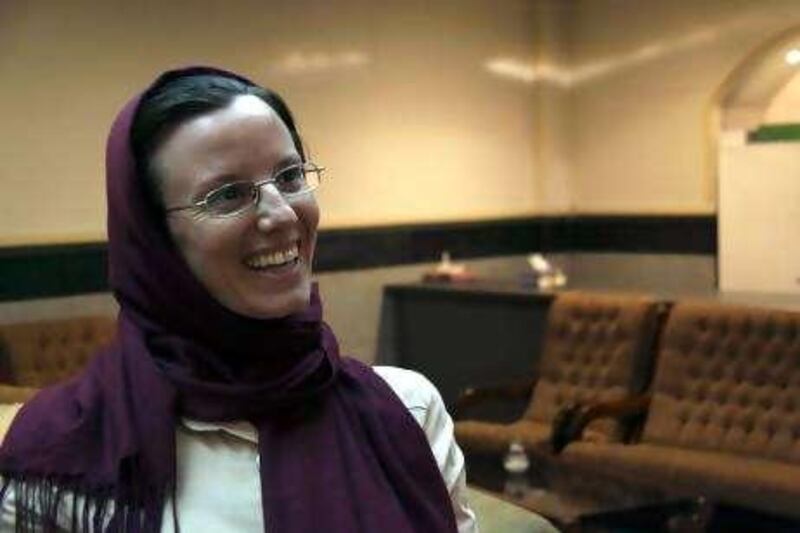Iran yesterday released a US backpacker held in solitary confinement for 13 months in Evin prison in Tehran. Sarah Shourd, 32, flew to Oman for an emotional reunion last night with her mother.
Her two male hiking companions remain in jail facing trial before a revolutionary court on spying charges that they, their families, and Washington have rejected as ridiculous. The three were arrested in a scenic area near Iran's poorly-defined border with Iraqi Kurdistan in July last year. Barack Obama, the US president, welcomed Ms Shourd's release but called for her friends to be freed as well.
"While Sarah has been released, Shane Bauer and Josh Fattal remain prisoners in Iran who have committed no crime," he said. Ms Shourd had been due to be freed unconditionally on Saturday in what Iran's state media described as an end-of-Ramadan goodwill gesture by Mahmoud Ahmadinejad. But the Iranian president's conservative rivals in the judiciary blocked the move at the last minute, insisting he had no right to intervene in their affairs.
Having publicly rebuked Mr Ahmadinejad and flexed its muscles, the judiciary said within hours that Ms Shourd could be freed on a bail of $500,000 (Dh1.84 million) because she was in poor health. It was not clear last night whether that surety - which her family said they could not raise - had been paid, although Tehran claimed that the sum had been deposited in an Oman bank. Ms Shourd, 32, is suffering from a pre-cancerous cervical condition, a lump in her breast and depression, her mother has said.
Ms Shourd and Mr Bauer, 28, were engaged in jail in May and will marry when he is released. He proposed with a ring woven with threads from his prison towel. Mr Ahmadinejad had wanted to take credit for her release to burnish his image before he travels to New York to address the UN General Assembly next week, analysts said. Ms Shourd's release came as another veteran Iranian diplomat - the third this year - defected in Europe and declared he was joining the opposition because of a crisis of conscience over the violence against protesters after Mr Ahmadinejad's disputed re-election in June 2009.
Farzad Farhangian, a 47-year-old press attache at Iran's embassy in Belgium, announced his intentions after flying to Norway with his family. "I want this government overthrown," he told a packed press conference in Oslo. Another Iranian diplomat, who defected with his wife and three children in Finland days earlier, said he knew of more envoys expected to follow suit once they are in position to do so. "There are many dissidents in Tehran's foreign ministry," said Hossein Alizadeh, who was Iran's second-most senior diplomat at its embassy in Helsinki. "The regime has lost its legitimacy and its efficiency." A former senior European envoy to Tehran said the Iranian authorities would be "appalled and deeply embarrassed" by the haemorrhage of its well-paid and privileged representatives abroad. "A revolutionary regime likes to think that its public servants are going to be enthusiastically supportive of the system's ideology and how it's manifested," he said. "The regime places huge importance on strength and solidarity and unity of purpose." Mr Farhangian, who fled at the weekend to Oslo with his wife and teenage son, said his life and those of his family were in danger. He added: "I'm apologising to the Iranian people. During the last 30 years I was of service to the Iranian people, but the deviation that the Iranian republic has reached leaves me no choice. I hope to be the voice of the opposition." He chose Norway to seek asylum because "one of my old colleagues was there", he said, referring to Mohammad Reza Heydari, who was granted asylum after leaving his post as an Iranian consular official in Oslo in January. Mr Heydari was the first of the three diplomats to defect this year and seek asylum in a Nordic country. Karim Sadjadpour, an Iran specialist at the Carnegie Endowment for International Peace in Washington, said the defections reflected widespread discontent about the Iranian regime even among the country's officials. "There is enormous disaffection within the Iranian foreign ministry," he said. "But Iranian diplomats face a difficult dilemma. If they resign out of principle, they lose their livelihoods and have to apply for political asylum. That's not an easy decision to make if you have a family to feed." Mr Alizadeh, 45, who worked for the Iranian foreign ministry for more than 20 years, said he would face execution if he returned to Iran. "I don't consider myself any more a diplomat standing beside a brutal Iranian regime," he told reporters this week. "I am a political dissident. I cannot accept this election fraud." Analysts said the defections must also be linked to fury within Iran's foreign ministry over Mr Ahmadinejad's controversial recent appointment of his own foreign policy team. The move drew sharp rebukes both from the Iranian parliament and the country's supreme leader, Ayatollah Ali Khamenei.
mtheodoulou@thenational.ae





